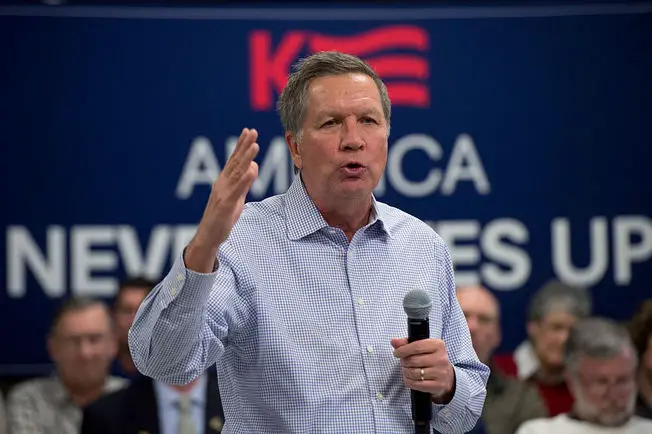You’ve probably heard that no Republican candidate has become president without winning the Ohio primary. Well, it ain’t exactly so, as Time Magazine points out.
In 1968, Richard Nixon won the White House even though James Rhodes—the state’s governor, like Kasich—won the Ohio Republican primary.
Likewise, Dwight Eisenhower won the general election in both 1952 and 1956 even though the Ohio primaries in those years were won by Robert Taft and John Bricker, respectively. (A full list of the candidates and results for primaries 1912–2012 can be found in the CQ Press Guide to U.S. Elections.)
Neither Nixon nor Eisenhower appeared on the ballot in Ohio in the relevant years. In 1968 and 1956, there was only one man to choose from. In 1952, there was another option, but it was Harold E. Stassen, not Eisenhower. (In fact, Eisenhower was still fulfilling his military service when 1952 started, and made a point of staying out of the race until drafted by his party.)
OK, so let’s correct it to say “no Republican who has LOST the Ohio primary has won the presidency.” Here’s a breakdown, also from Time:
• There were 26 presidential primaries in Ohio in the century between 1912 and 2012, which means we’re trying to predict the future using an extremely small sample size.
• In nine of those cases, a candidate won all three contests: Ohio primary, national nomination, general election.
• In six cases, victory in the first two did not lead to the White House.
ˆ In 11 cases, the candidate who won in Ohio did not win the nomination—though in three of those years, discussed above, the eventual Republican nominee did win in the end, without having won in Ohio.
If Donald Trump were superstitious, he might have taken his name off the ballot in Ohio. It was clear that John Kasich is popular, and he has put a lot of time in his home state. If Trump had avoided Ohio, he could have said he was like Eisenhower and Nixon, and could still win in November.
This started us wondering if there were other “rules” in US elections, and we turned to The Atlantic Magazine:
Prior to the reelection of General Grant in 1872, there was a superstition prevalent that no man possessed of a middle name could be elected President a second time. . .
There is another superstition, much more commonly held, which has not yet been falsified, that no senator can be elected President.
While Kasich would like you to believe that, how did the writer miss that Senator John F. Kennedy was elected president in 1960? However, it didn’t work so well for Presidents Goldwater, McGovern, Mondale, Dole, Kerry, and McCain. JFK was the ONLY senator to become president, except for President Obama. Take THAT, Senators Cruz, Rubio, and Sanders!
Barack Obama also broke other things taken for granted (besides, you know, being the first African-American to hold the office). According to NPR, there were five “truisms” that failed when President Obama won re-election:
[1] The combination of a down economy and high unemployment dooms incumbents.. . .
[2] Presidential candidates need to campaign in states in order to win them. . .
[3] Undecideds always vote for the challenger. . .
[4] The taller candidate always wins. . .
[5] It ain’t over till it’s over. Actually, though the fate of Florida was still undecided at the time of Romney’s concession speech, it … was … over.
OK, so truisms sometimes stop being true. This year, we have a chance to test the Ohio rule. If Kasich wins Ohio, as expected, Trump will have to beat history to win the presidency. OR—if Kasich wins the state and the presidency, we’ll all wish we had put money on him, since Kasich currently is given only a 3.7% chance of becoming president.
Donate Now to Support Election Central
- Help defend independent journalism
- Directly support this website and our efforts
